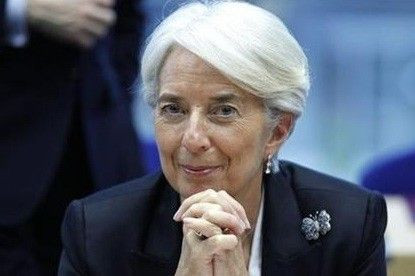IMF Chief Lagarde Cautions On Global Economic Recovery, Praises China

International Monetary Fund (IMF) chief Christine Lagarde has praised China's efforts to shift from exports towards more domestic consumption, but issued a warning that there should be no false sense of security over the health of the global economy.
Speaking in Beijing Sunday, the IMF chief stopped short of saying the changes had eased the Fund's concerns that China was deliberately undervaluing its currency -- a long-simmering source of tension between the rising Asian giant and Western policymakers, The Wall Street Journal reported.
Indeed, last July the IMF said China's yuan was undervalued by as much as 23 percent, with Western governments say is a deliberate tactic to increase the country's trade advantage.
For now, Lagarde appears to be emphasizing a fragile global economic recovery and China's role in it.
The world economy has stepped back from the brink and we have causes to be a little bit more optimistic, Lagarde said, according to Reuters.
But optimism should not give us a sense of comfort and certainly should not lull us into a false sense of security.
Lagarde added that the global economic recovery will be more of a marathon than a sprint.
She added high levels of public debt, rising oil prices and a growing risk that activity in emerging economies will slow over the medium term, could all hamper global economic growth.
Praising China's efforts to reform its traditionally export-led economy, Lagarde said the country needed to concentrate on supporting growth, promoting more domestic consumption and encouraging a greater distribution of wealth.
Speaking to the Wall Street Journal, she said China's slowing economy was also a special concern.
Re-engineering of the growth model is being advocated at the highest levels of government-and this is highly desirable, she stated.
China's current account surplus fell below 3 percent of GDP last year from highs of 10 percent in 2007, a move praised by Lagarde as a significant development, according to the WSJ.
In separate talks, Lagarde said China's yuan could become a reserve currency of the future, joining the U.S. dollar, the Euro and the Yen.
What is needed is a roadmap with a stronger and more flexible exchange rate, more effective liquidity and monetary management, with higher quality supervision and regulation, with a more well-developed financial market, with flexible deposit and lending rates, and finally with the opening up of the capital account, she told a gathering of leading Chinese policymakers and global business leaders, according to Reuters.
If all that happens, there is no reason why the renminbi will not reach the status of a reserve currency occupying a position on par with China's economic status.
© Copyright IBTimes 2025. All rights reserved.





















